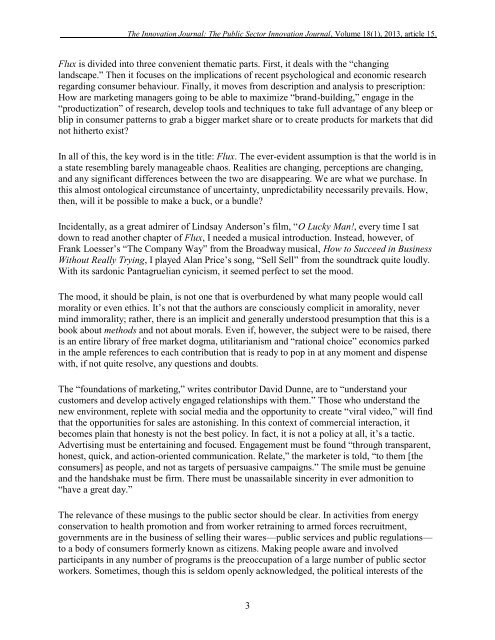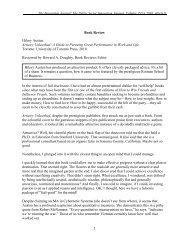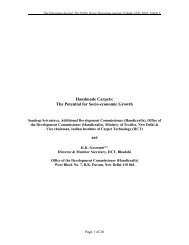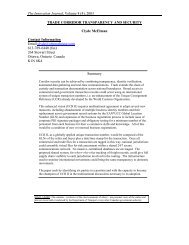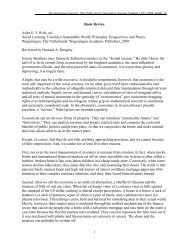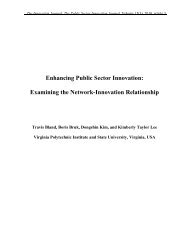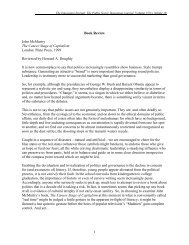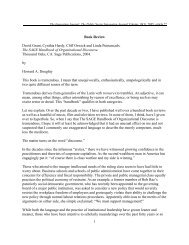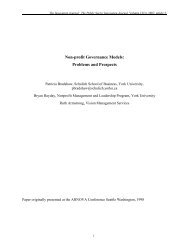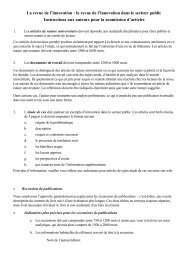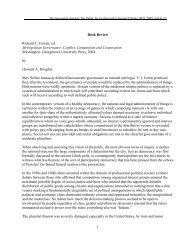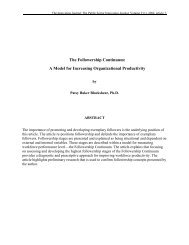What Marketing Managers Need to Navigate the New Environment
What Marketing Managers Need to Navigate the New Environment
What Marketing Managers Need to Navigate the New Environment
Create successful ePaper yourself
Turn your PDF publications into a flip-book with our unique Google optimized e-Paper software.
The Innovation Journal: The Public Sec<strong>to</strong>r Innovation Journal, Volume 18(1), 2013, article 15.<br />
Flux is divided in<strong>to</strong> three convenient <strong>the</strong>matic parts. First, it deals with <strong>the</strong> “changing<br />
landscape.” Then it focuses on <strong>the</strong> implications of recent psychological and economic research<br />
regarding consumer behaviour. Finally, it moves from description and analysis <strong>to</strong> prescription:<br />
How are marketing managers going <strong>to</strong> be able <strong>to</strong> maximize “brand-building,” engage in <strong>the</strong><br />
“productization” of research, develop <strong>to</strong>ols and techniques <strong>to</strong> take full advantage of any bleep or<br />
blip in consumer patterns <strong>to</strong> grab a bigger market share or <strong>to</strong> create products for markets that did<br />
not hi<strong>the</strong>r<strong>to</strong> exist?<br />
In all of this, <strong>the</strong> key word is in <strong>the</strong> title: Flux. The ever-evident assumption is that <strong>the</strong> world is in<br />
a state resembling barely manageable chaos. Realities are changing, perceptions are changing,<br />
and any significant differences between <strong>the</strong> two are disappearing. We are what we purchase. In<br />
this almost on<strong>to</strong>logical circumstance of uncertainty, unpredictability necessarily prevails. How,<br />
<strong>the</strong>n, will it be possible <strong>to</strong> make a buck, or a bundle?<br />
Incidentally, as a great admirer of Lindsay Anderson’s film, “O Lucky Man!, every time I sat<br />
down <strong>to</strong> read ano<strong>the</strong>r chapter of Flux, I needed a musical introduction. Instead, however, of<br />
Frank Loesser’s “The Company Way” from <strong>the</strong> Broadway musical, How <strong>to</strong> Succeed in Business<br />
Without Really Trying, I played Alan Price’s song, “Sell Sell” from <strong>the</strong> soundtrack quite loudly.<br />
With its sardonic Pantagruelian cynicism, it seemed perfect <strong>to</strong> set <strong>the</strong> mood.<br />
The mood, it should be plain, is not one that is overburdened by what many people would call<br />
morality or even ethics. It’s not that <strong>the</strong> authors are consciously complicit in amorality, never<br />
mind immorality; ra<strong>the</strong>r, <strong>the</strong>re is an implicit and generally unders<strong>to</strong>od presumption that this is a<br />
book about methods and not about morals. Even if, however, <strong>the</strong> subject were <strong>to</strong> be raised, <strong>the</strong>re<br />
is an entire library of free market dogma, utilitarianism and “rational choice” economics parked<br />
in <strong>the</strong> ample references <strong>to</strong> each contribution that is ready <strong>to</strong> pop in at any moment and dispense<br />
with, if not quite resolve, any questions and doubts.<br />
The “foundations of marketing,” writes contribu<strong>to</strong>r David Dunne, are <strong>to</strong> “understand your<br />
cus<strong>to</strong>mers and develop actively engaged relationships with <strong>the</strong>m.” Those who understand <strong>the</strong><br />
new environment, replete with social media and <strong>the</strong> opportunity <strong>to</strong> create “viral video,” will find<br />
that <strong>the</strong> opportunities for sales are as<strong>to</strong>nishing. In this context of commercial interaction, it<br />
becomes plain that honesty is not <strong>the</strong> best policy. In fact, it is not a policy at all, it’s a tactic.<br />
Advertising must be entertaining and focused. Engagement must be found “through transparent,<br />
honest, quick, and action-oriented communication. Relate,” <strong>the</strong> marketer is <strong>to</strong>ld, “<strong>to</strong> <strong>the</strong>m [<strong>the</strong><br />
consumers] as people, and not as targets of persuasive campaigns.” The smile must be genuine<br />
and <strong>the</strong> handshake must be firm. There must be unassailable sincerity in ever admonition <strong>to</strong><br />
“have a great day.”<br />
The relevance of <strong>the</strong>se musings <strong>to</strong> <strong>the</strong> public sec<strong>to</strong>r should be clear. In activities from energy<br />
conservation <strong>to</strong> health promotion and from worker retraining <strong>to</strong> armed forces recruitment,<br />
governments are in <strong>the</strong> business of selling <strong>the</strong>ir wares—public services and public regulations—<br />
<strong>to</strong> a body of consumers formerly known as citizens. Making people aware and involved<br />
participants in any number of programs is <strong>the</strong> preoccupation of a large number of public sec<strong>to</strong>r<br />
workers. Sometimes, though this is seldom openly acknowledged, <strong>the</strong> political interests of <strong>the</strong><br />
3


